Automotive stocks: The effect of tariffs on shares of popular automakers

Audley C Bullock // Shutterstock
Automotive stocks: The effect of tariffs on shares of popular automakers
The Trump administration announced on March 26 a 25% tariff on imports of automobiles and certain automobile parts, aiming to bolster U.S. manufacturing and protect national security.
Unsurprisingly, it sent shockwaves through the automotive industry and financial markets—consumers rushed to buy cars ahead of potential price hikes, and investors scrambled to assess the fallout. According to Finder data, there was plenty of fallout.
To add to the uncertainty, on April 14, President Donald Trump suggested he might temporarily exempt the auto industry to allow carmakers time to adjust their supply chains.
The following data is of automaker stock price action through market close on April 14. Explore data of automaker stocks and the impact of auto tariffs globally to see which auto stocks have stalled—or accelerated—since tariffs hit.
Trump’s tariffs on automobiles
The Trump administration’s original March 26 executive proclamation imposes a 25% tariff on all cars shipped to the U.S., effective April 3. Tariffs on key auto parts—engines, transmissions, powertrain parts and electrical components—will follow on May 3.
The White House expects the auto tariffs to raise $100 billion in revenue annually.
5 biggest winners and losers from Trump tariffs
Tariffs like these are often seen as a direct hit to automakers’ bottom lines because they drive up production costs and disrupt global supply chains. While companies with robust U.S.-based supply chains could, in theory, gain a competitive edge as rivals reliant on foreign components face higher costs, industry analysts believe this new tax will spare few vehicle manufacturers.
The automotive industry has complex, cross-border supply chains, meaning there is no car that is 100% made in America.
And Finder sees in automaker stock prices that no car manufacturer has been left unscathed.
As of market close on April 14, the biggest winners, if you can call them winners, from Trump’s tariffs are NWTN Inc., Honda, Porsche, BYD and REE Automotive. These stocks have seen the smallest decline since Trump’s tariff announcement on March 26.
The biggest losers are Mullen Automotive, Phoenix Motor, Polaris, Stellantis and Lotus Technology. These stocks have seen the largest share price decline since the tariff announcement.
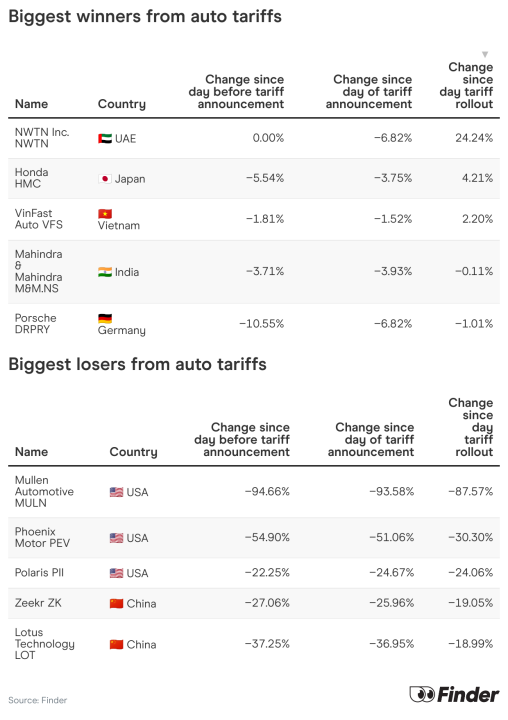
Finder
The impact of auto tariffs on stocks of different regions
According to Wedbush Securities Inc. analyst Daniel Ives, Trump’s automobile tariffs “will cause pure chaos to the global auto industry” and increase the average price of cars sold in the U.S. by as much as $10,000.
And that’s what we’ve seen so far when looking at share prices.
According to Finder’s data, automaker stocks across the board responded negatively to President Trump’s 25% tariff announcement, with U.S. carmaker stocks seeing the largest decline on average.
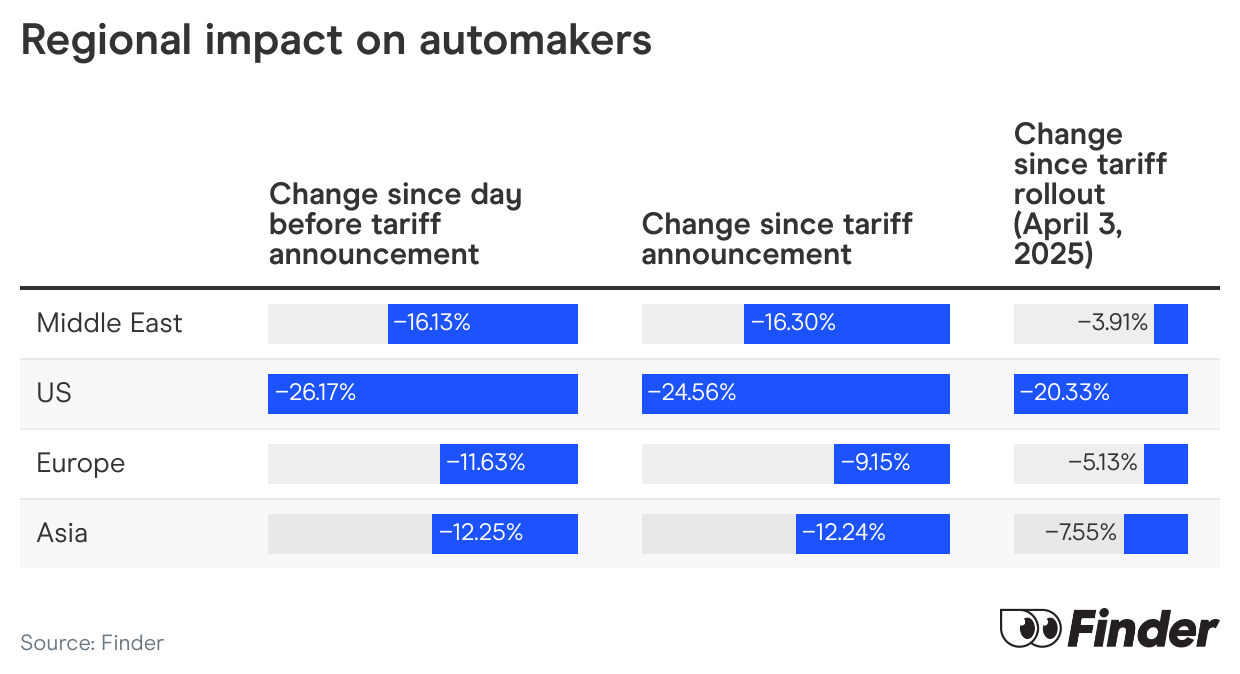
Finder
Impact on US automakers
It’s been a turbulent time for many U.S. automakers, including Lucid Group stock (Lucid Motors), General Motors (GM) and Tesla (TSLA).
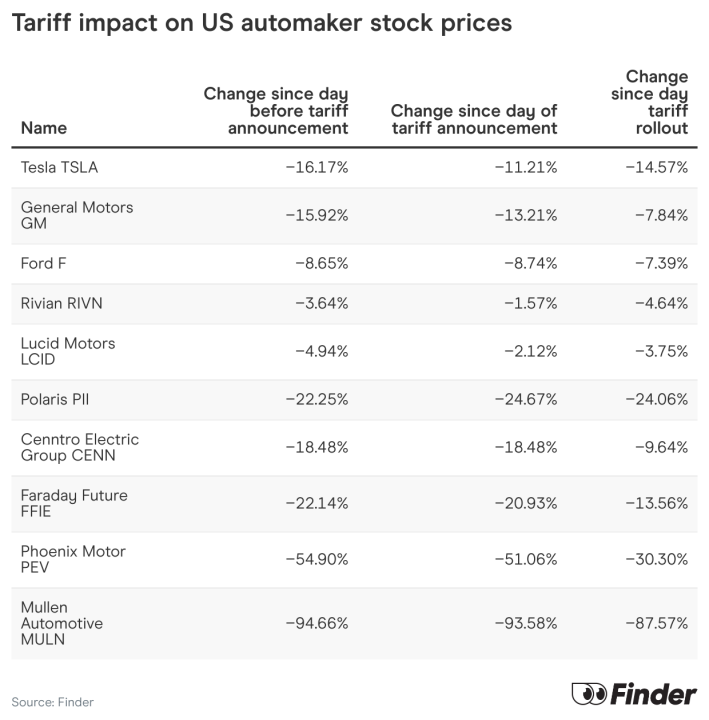
Finder
Impact on European automakers
There have been no winners in the European auto-making market, with Ferrari (RACE), Polestar (PSNY) and Porsche (DRPRY) all seeing major declines since the tariff rollout.

Finder
Impact on Asian automakers
Asian auto makers have also seen major dips since the tariffs were implemented.
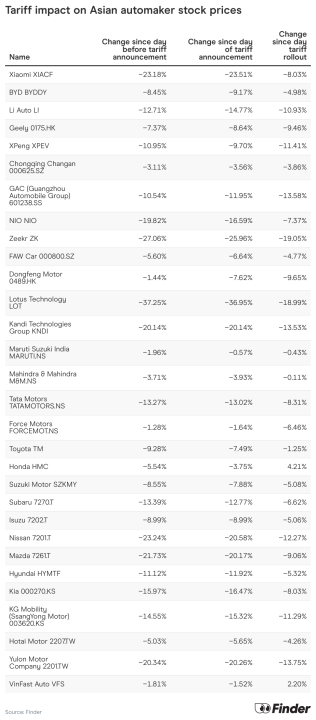
Finder
Impact on Middle Eastern automakers
Middle Eastern automakers have seen many ups and downs (mostly downs) since the tariff announcement.
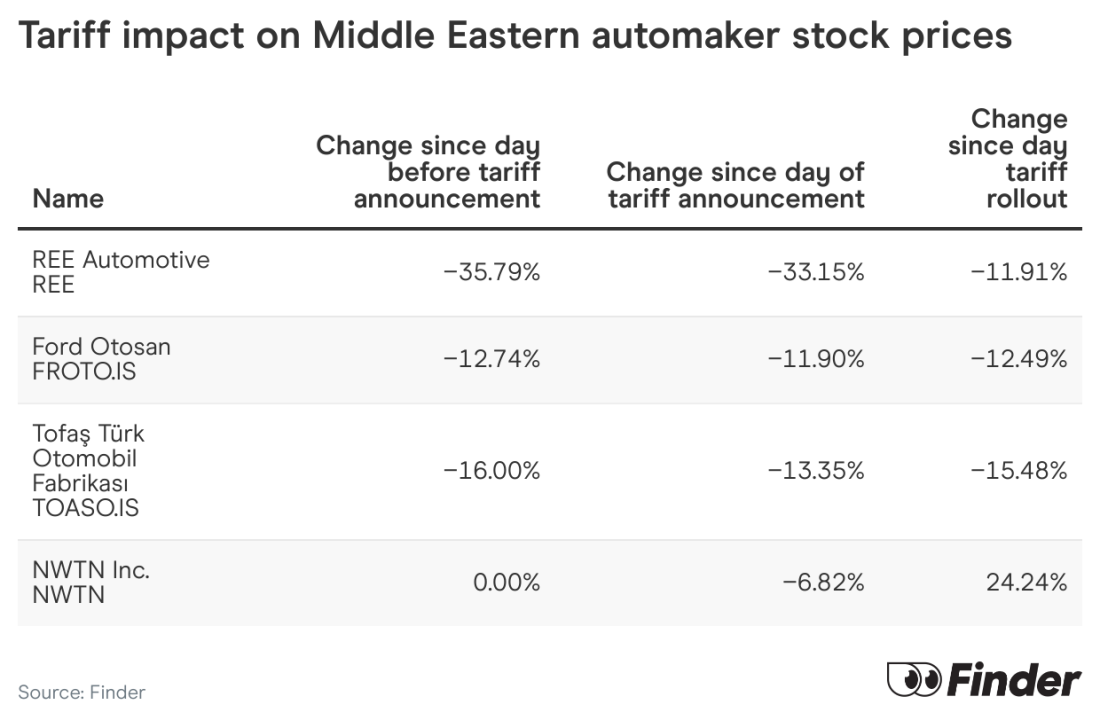
Finder
What are tariffs?
Tariffs are taxes that governments impose on goods entering or leaving a country, and they’re typically used to raise revenue, protect domestic industries or regulate international trade.
Dating back thousands of years, tariffs have long been a tool of economic policy. They gained prominence in the U.S. with the U.S. Tariff Act of 1789, which aimed to protect domestic manufacturing and generate revenue, and have seen a resurgence in use as a policy tool under the Trump Administration.
This story was produced by Finder and reviewed and distributed by Stacker.
![]()



